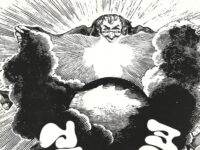This release is “a fresh new version of Tomorrow’s legendary debut re-imagined by (drum roll!!) Steve Howe.” Now, for the initiate, Tomorrow was a psych-rock band that featured stalwart Yes guitarist Steve Howe, Keith West, and the rather amazing Twink (of Pretty Things and solo fame!), whose collective music conjures the memory of those magical days of consuming Tolkien’s Lord of the Rings for the first time, and truly, finding Middle Earth a colorful “yellow brick road” into my desire for a liberal-arts education. Such were the times!
As I have said countless times, “If it’s just a question of luck, then I’m just lucky.” I listened to John Lennon’s solo stuff, Roy Harper, the Edgar Broughton Band, Fairport Convention, (my beloved) Mott the Hoople, Can, Kevin Ayers, Peter Hammill and Van der Graaf Generator, Jade Warrior, and (my also beloved) Kinks.
All of this music just stuffed my brain synapses with delightful late-October Halloween underground sacred-fire melodies, with wonderfully weird vinyl revolutions. The results, to quote Bob Marley, were intended to “Free your mind from mental slavery.”
To the point: Tomorrow plays the precursor clever psych rock very much in the vogue, circa 1968-69, before the music scene morphed into longer and more progressive signatures of Genesis, King Crimson, Emerson Lake and Palmer, Yes and countless other brilliant bands like Gentle Giant, Camel and Caravan. But this is deeply interesting and expansive music that is quite equal to the best of the psych-fueled field of bands like the Blossom Toes, the Move, The Pink Fairies, Syd Barrett-era Pink Floyd, the Action, (the obscure) Tripsichord Music Box, and the Pretty Things with their masterpiece, S.F. Sorrow. This music just spins the mind a bit.
To yet another point: Tomorrow’s original debut contained 11 tracks. My 1999 EMI compact disc also included five bonus tracks, and seven others listed under the sections “The Aquarian Age” and “Keith West.” It’s a good package. But (to quote yet another great underground psych band, the Deviants) “PTOOFF!”
This is a new “re-imagined” version by original member Steve Howe, who “post-produced using the technology now available on the balance and edits to enhance and re-present what the band were trying to achieve 55 years ago.” Not only that, this update includes “some less well-known studio tracks, a new title, running order and sleeve” with “notes by Steve Howe and John ‘Twink’ Alder,” and the whole thing has been “remastered from the original mono mixes.” For long-time fans, however, it also scrambles the original order.
The harpsichord pulsed “Auntie Mary’s Dress Shop” is gone, as is the equally twee “Shy Boy,” as both songs are quite dated (sort of “Maxwell’s Silver Hammer”) pop music. “Colonel Brown” is also gone, and that’s sort of a shame because it recalls the Kinks circa Something Else. But the brisk “Why,” with its glorious guitar solo has been added. Thank you, Steve Howe! This tune was a bonus track on the EMI CD issue.
Ditto for “Claramount Lake,” which has another intense guitar solo, and is yet another pretty great glance at the Kinks’ mid-to-late ’60s sound. The unearthed “Caught in the Web” rocks and gets jazzy in the magical way Wishbone Ash later would do on their early albums.
The first tune in this rearranged order is “Real Permanent Dream,” which gets a “Version One” and “Version Two” inclusion. The former rocks hard, while the latter retains the Eastern sitar-laced vibe, curtesy of (the great!) Big Jim Sullivan. The retained songs simply drip with (rock) “candy-coloured rain.” “My White Bicycle” (with its great Twink and John Wood bash!) could be a soundtrack for an Eastern adventure travelogue.
“Revolution” (recorded well before the Beatles’ White Album song of the same name) finds a wah-wah girth and then gets all psych-folky in a wonderful way, before it erupts into a brief guitar finale. Well (while speaking of the Fab Four), the cover of “Strawberry Fields Forever” is nice, but hardly inventive. Such, I suppose, were the clever cover times.
Thankfully, “Three Jolly Dwarfs” retains its Tolkien At the Sign of the Prancing Pony pub innocence.
The very excellent “Now Your Time Has Come,” with wah-wah galore and an urgent Keith West vocal, not only travels through a psych time warp pretty well, but as a bonus, there’s a live recording which quickens the pulse rate with a rough tension, an Eastern vibe, and a decent sound as Tomorrow shouts and rocks its way through the before-mentioned psych time warp.
The other bonus live recording, “Shotgun and the Duck,” rocks with a nod to (the great) Chuck Berry, with a nice guitar-bass-drum fling that coughs, claps a bit, and then becomes both its own fire and extinguisher in a pre-Yes days musical dialogue.
Of course, not to forget two other songs: “Hallucinations” swirls with the groovy times and really does match the excellence of the Pretty Things. That’s a big compliment. Just so you know, lots of bands sang about “rainbows” way back then. “The Incredible Journey of Timothy Chase” finishes the album proper (with those two live tracks added to the shuffled studio album) and slow burns even more “candy-coloured rain” with a melody that’s gentle, complex, and has the depth of either Greek drama or a clever Sir Raymond Davies Kinks hit single.
As Adolphus Huxley once said, “You pays your money and you takes your choice.” And, in fairness, the same is true for this new “re-imagined” version of Tomorrow’s music that toughens the grooves, because in fairness, the EMI compact disc softens the sounds and puffs sweet psychedelic space that floats like Coleridge’s Kubla Khan and his Xanadu with “sinuous rills” that flow into couched sinews of any brain’s cosmic lounge.
So, “pays your money and “takes your choice,” and then love both versions, which are bequeathed with equal rock ‘n’ roll magic from “caverns measureless to man.” Yet somehow, they are always able to find a backbeat to which those three jolly little dwarfs can continue, endlessly, their jolly little dance.
- Coincidence – ‘Coincidence,’ ‘Clef de Ciel’ + ‘Archives 1973-1974’ (2024) - November 17, 2024
- Mile Marker Zero – ‘Coming of Age’ (2024) - October 14, 2024
- Burton Cummings – ‘A Few Good Moments’ (2024) - October 7, 2024



